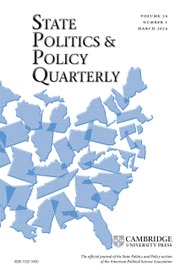Article contents
Misreport of Vote Choice in U.S. Senate and Gubernatorial Elections
Published online by Cambridge University Press: 25 January 2021
Abstract
Previous research has found strong evidence of a pro-winner vote misreport bias in the National Election Studies (NES). We extend this research by examining the reported vote for U.S. senator and governor in the 1990, 1992, and 1994 NES and in the 1990 and 1992 Senate Election Studies (SES). We find continuing evidence of a pro-winner misreport problem. In contrast, we uncover no significant pro-winner bias in state exit polls conducted by the media. We test two commonly asserted explanations of the source of this misreport bias, but find no evidence that the problem is related either to the number of days between the election and the survey interview or to incumbency. Finally, we test a model of the misreport process that suggests that less politically engaged and less politically sophisticated voters are most likely to over-report support for the winner. Our results here are mixed; we find some evidence that Independents are more likely to misreport in favor of the winner, but we find no evidence that education level affects the likelihood of misreporting.
- Type
- Research Article
- Information
- Copyright
- Copyright © 2001 The American Political Science Association
References
- 8
- Cited by


